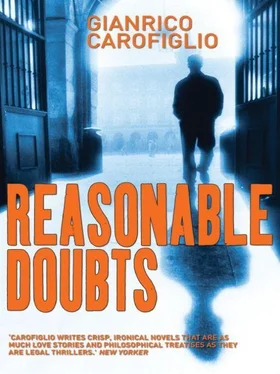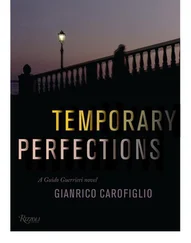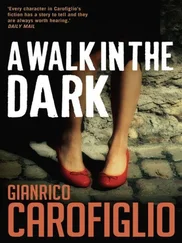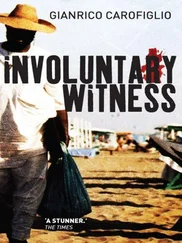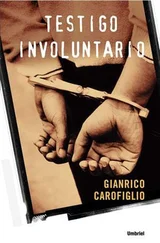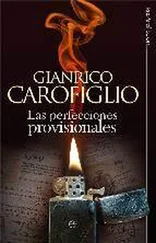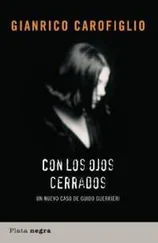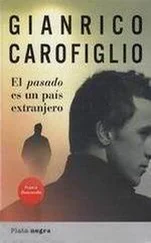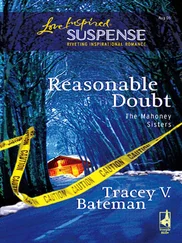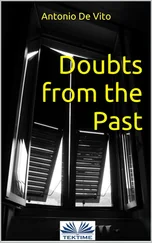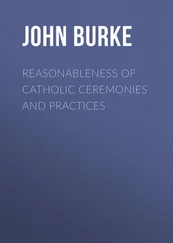Gianrico Carofiglio - Reasonable Doubts
Здесь есть возможность читать онлайн «Gianrico Carofiglio - Reasonable Doubts» весь текст электронной книги совершенно бесплатно (целиком полную версию без сокращений). В некоторых случаях можно слушать аудио, скачать через торрент в формате fb2 и присутствует краткое содержание. Жанр: Криминальный детектив, на английском языке. Описание произведения, (предисловие) а так же отзывы посетителей доступны на портале библиотеки ЛибКат.
- Название:Reasonable Doubts
- Автор:
- Жанр:
- Год:неизвестен
- ISBN:нет данных
- Рейтинг книги:5 / 5. Голосов: 1
-
Избранное:Добавить в избранное
- Отзывы:
-
Ваша оценка:
- 100
- 1
- 2
- 3
- 4
- 5
Reasonable Doubts: краткое содержание, описание и аннотация
Предлагаем к чтению аннотацию, описание, краткое содержание или предисловие (зависит от того, что написал сам автор книги «Reasonable Doubts»). Если вы не нашли необходимую информацию о книге — напишите в комментариях, мы постараемся отыскать её.
Reasonable Doubts — читать онлайн бесплатно полную книгу (весь текст) целиком
Ниже представлен текст книги, разбитый по страницам. Система сохранения места последней прочитанной страницы, позволяет с удобством читать онлайн бесплатно книгу «Reasonable Doubts», без необходимости каждый раз заново искать на чём Вы остановились. Поставьте закладку, и сможете в любой момент перейти на страницу, на которой закончили чтение.
Интервал:
Закладка:
It was my turn to give a forced smile.
“What’s going to happen?”
“Impossible to predict. Or at least I can’t. Anything can happen.”
She nodded. She hadn’t really expected any other answer.
“Can we get out of here, go for a coffee or something?”
“Of course; it’ll be a while before the decision.”
I was about to add that if they came to a decision straight away it wasn’t a good sign. It meant that they had upheld the sentence without even taking into account the things I’d been trying to say. But I stopped myself. It was pointless information, at this stage.
We left the courthouse, had a coffee, then had a little stroll and went back. We didn’t talk much. Just enough to give a bit of direction to the silence. I don’t know what she was feeling. She didn’t tell me and I couldn’t figure it out. Or maybe I didn’t want to. I felt great tenderness for her, but it was a sad, resigned, distant, intangible tenderness.
At five, the courthouse emptied. Doors closing, voices, hurried footsteps.
And then silence, the strange, unmistakable silence of deserted offices.
It was just before six that we saw the escort coming back into the courtroom with Paolicelli. They passed close to us. He looked at me, searching for a message in my eyes. He didn’t find one. In all my years as a lawyer, I’ve rarely felt so unsure of the result of a case, so incapable of making predictions.
I went back to my seat, while the guards put Paolicelli back in the cage, the prosecutor came back into the courtroom, and Natsu returned to the now deserted public benches.
Then the judges came out, without even ringing the bell.
Mirenghi read out the decision quickly. Before I’d even had time to adjust the robe on my shoulders. He read it with a very tense expression on his face, and I was sure that they hadn’t been unanimous. I was sure that Mirenghi had fought for the sentence to be upheld, but that the other two had outvoted him.
The court overturned the previous sentence and acquitted Fabio Paolicelli of the charge against him on the grounds that the act does not constitute an offence.
In our jargon the expression the act does not constitute an offence can mean many different things. In this case it meant that Paolicelli had indeed physically transported the drugs – that was a fact, there was no doubt – but without being aware of it. There was no motive, and an absence of criminal intent.
The act does not constitute an offence.
Acquittal.
Immediate release of the defendant if not held for other reasons.
Mirenghi caught his breath for a moment and then resumed reading. There was something else.
“The court asks that the ruling and the transcripts of the appeal hearing be sent to the regional anti-Mafia department for examination.”
That meant the affair wasn’t over. It meant that the anti-Mafia department would deal with my colleague Macri and his friend Romanazzi.
It might mean trouble for me. But I didn’t want to think about that now.
Mirenghi declared the hearing over and turned to leave. Girardi also turned.
But Russo hesitated for a moment. He looked at me and I looked at him. His back was straight and he seemed ten years younger. I’d never seen him like that before. He nodded, almost imperceptibly.
Then he, too, turned and followed the others into the chamber.
48
They let Paolicelli out of the cage. He still had to be taken back to prison to go through the formalities of release, but they didn’t put his handcuffs on, because he was a free man now. He came towards me, surrounded by the guards. When he came level with me, he embraced me.
I responded graciously to the embrace, patting him on the back and hoping it would soon be over. After me, he embraced his wife, kissed her on the mouth, and told her he would see her at home that evening.
She said she would come and pick him up but he said no, he didn’t want her to.
He didn’t want her to go near that place even for a moment. He would come home alone, on foot.
He wanted to prepare himself for seeing his daughter, and a walk would be the ideal way of doing that.
Besides, it was spring. It was a nice thing to walk home, free, in the spring.
His lower lip was trembling and his eyes watery, but he didn’t cry. At least not while he was still in the courtroom.
Then the head of the escort told him, gently, that they had to go.
One of the guards, a tough-looking old character with very blue eyes and a scar that started under his nose and went across his lips all the way down to his chin, came up to me. He had a voice roughened by cigarettes and thirty years spent among thieves, dealers, traffickers and murderers. He was a prisoner, too, who wouldn’t finish his sentence until the day he retired.
“Congratulations, Avvocato. I listened to you and understood everything.” He pointed to Paolicelli, who was already walking away with the other two guards. “You saved that man.”
And then he rushed off to join his colleagues.
Again, Natsu and I were alone. For the last time.
“And now?”
“Goodbye,” I said.
It came out well, I think. Goodbye is a hard word to say. You always run the risk of sounding pathetic, but this time I hit the right note.
She looked at me for a long time. If I let her image go slightly out of focus and replaced her eyes with two big blue circles, I could see her daughter Midori as she would be in twenty years’ time.
In 2025. I tried not to think about how old I would be in 2025.
“I don’t think I’ll ever meet anyone else like you.”
“Well, I should hope not,” I said. It was meant as a kind of joke, but she didn’t laugh.
Instead, she looked around, and when she was sure the courtroom was really deserted, she gave me a kiss.
A real kiss, I mean.
“Goodbye,” she said and walked out into the deserted corridor.
I gave her five minutes’ head start and then left.
49
All the windows in my apartment were open, but the sounds coming in from the street were curiously muffled. They were like sounds I used to hear many years ago, when I was a child and we went to the park on May afternoons to play football.
I put on a CD, and it wasn’t until I’d already played several songs that I realized it was the same one I’d played that first night Natsu had come home with me.
These days miracles don’t come falling from the sky.
As I listened to the music, I poured myself a whisky on the rocks, and drank it, and ate corn chips and pistachio nuts. Then I had a long shower in cold water. Without drying myself, I walked round the apartment enjoying the smell of the bath foam on my skin, the music, the slight dizziness I felt because of the whisky, the cool breeze that came in through the open windows and made me shiver.
Once I was dry I got dressed, put on some pointless scent, and went out.
It was mild in the streets. I decided that before having dinner I would walk as far as the Piazza Garibaldi, where my parents and I used to live when I was a child.
When I got there, I was seized with the kind of intangible, all-consuming joy you feel sometimes when you’re sucked back into the past. The gardens of the Piazza Garibaldi, that late afternoon in May, looked the way they had all those years ago, and in among the boys playing football were the ghosts of myself and my friends as children, in short trousers and braces, licking the Super Santos ball we’d all chipped in to buy.
I sat down on a bench and sat there looking at the dogs and children and old people until it was dark and almost everyone had gone. Then I left, too, to look for somewhere to eat. I was heading in the direction of the seafront when my phone rang. A private number, the screen said.
Читать дальшеИнтервал:
Закладка:
Похожие книги на «Reasonable Doubts»
Представляем Вашему вниманию похожие книги на «Reasonable Doubts» списком для выбора. Мы отобрали схожую по названию и смыслу литературу в надежде предоставить читателям больше вариантов отыскать новые, интересные, ещё непрочитанные произведения.
Обсуждение, отзывы о книге «Reasonable Doubts» и просто собственные мнения читателей. Оставьте ваши комментарии, напишите, что Вы думаете о произведении, его смысле или главных героях. Укажите что конкретно понравилось, а что нет, и почему Вы так считаете.
